My coworker Jenica prints out spreadsheets, and then uses scissors and scotch tape to make them look the way she wants them to.
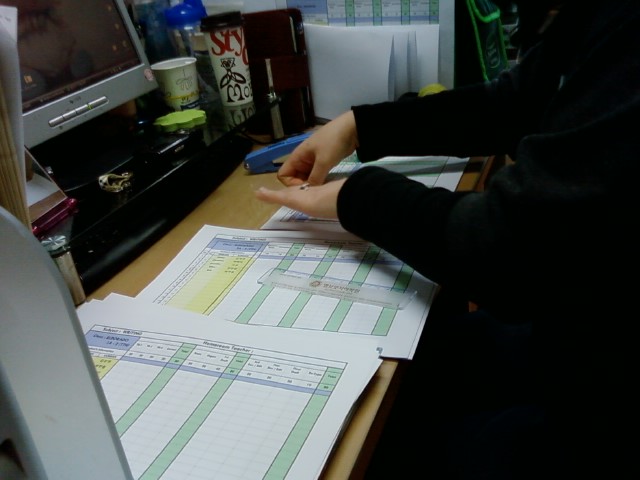
That’s taking the potentialities of “cutting and pasting” to a whole new level! It’s like… wow.
Wouldn’t it be cool if we could do the “Ctrl-C… Ctrl-V” thing in real life?
![]()
Caveat: Corned Beef Hash
My friend Basil showed me a curious little hole-in-the wall place only a block from where I live that serves American-style "brunch" on Sundays – eggs, hash browns, pancakes, bacon. All those very American breakfast foods that are so bad for you, but so comforting, too. "Denny's food," is how I always think of it.
For about 8 dollars (which is very expensive for low-end restaurant food, here), I got corned beef hash, french toast, eggs over easy, two cups of coffee. It was a nice nostalgia trip, but, for health reasons, not good to make into a habit. It's a good thing I'm not into going to restaurants alone – that place is too close to be entirely safe. "LOL." And… so much for incidental meat, eh?
Anyway, it was cool. And then he and I spent some time trying to study our Korean. He's not as far along as I am, which of course is good for my ego, because I get to be knowledgeable and erudite about it, which in fact I'm not. But, exploiting relative differences, and all that.
나는 콘비프 해시를 점심 먹었어요. 맛있었어요. 그래서, 지금 행복해요. 잘 지내세요… ^_^ 내일 보겠읍니다.
Caveat: Wobow! Thebey ubuse ubbi dubbi hebere!
Ubbi dubbi is a language game (or “language”) apparently popularized by the PBS TV program ZOOM. Which must be how I learned it – I remember practicing it with my friend Bob (or was it Mark or Ken?) on a number 6 Grand Ave bus in St Paul in the 1980’s, while fellow passengers looked on in bemusement.
Writing it down kind of loses the effect, mostly because of the unphonetic nature of English. Here is a video sample I found on youtube:
I also found an Ubbi Dubbi translator.
Well, I heard my students Amy and Sally using it with each other, the other day. In Korean! And this is actually documented… I found a brief reference to something called 도깨비말 (“ogre language”) in the English wikipedia article on language games.
What was so interesting and amazing to me about hearing it done in Korean is that, stunningly, I found the Korean easier to understand. I think it was because they have to slow down to do it, and it reduplicates the vowels, which are mostly fairly “pure” in Korean (unlike the messy diphthongs so common in English) which makes it easier to pick out which vowel is being used. How did it sound? Hmm… very briefly, I heard Amy say, for example, 그브래배? (keubeuraebae <= keurae = “is that right?”). Totally cool.
Caveat: A Tower Called Willis?
 Who ever heard of naming a tower “Willis”?
Who ever heard of naming a tower “Willis”?
Turns out the iconic Sears Tower, of Chicago, is taking on a new name. But somehow, “Willis Tower” just sounds… dumb. I’m sorry, I just don’t feel comfortable referring to a giant Lego-lookin’ sorta-phallic symbol as “Willis.”
![]()
Caveat: Glish
I was websurfing and found an interesting thing: Ilan Stavans has translated the first chapter of Don Quixote into a very entertaining Spanglish version. Here are the first few sentences:
In un placete de La Mancha of which nombre no quiero remembrearme, vivía, not so long ago, uno de esos gentlemen who always tienen una lanza in the rack, una buckler antigua, a skinny caballo y un grayhound para el chase. A cazuela with más beef than mutón, carne choppeada para la dinner, un omelet pa’ los Sábados, lentil pa’ los Viernes, y algún pigeon como delicacy especial pa’ los Domingos, consumían tres cuarers de su income. El resto lo employaba en una coat de broadcloth y en soketes de velvetín pa’ los holidays, with sus slippers pa’ combinar, while los otros días de la semana él cut a figura de los más finos cloths. Livin with él eran una housekeeper en sus forties, una sobrina not yet twenty y un ladino del field y la marketa que le saddleaba el caballo al gentleman y wieldeaba un hookete pa’ podear.
I've always been fascinated by the way that languages mix together. I have been hyperaware, lately, of the immense amount of Konglish found in my current South Korean environment. I spend a lot of time reading random signs, websites, and bits of advertising, just to practice, and when I do that, I am stunned by how much of it turns out simply to be English written in Korean hangul. Some examples from just the other day on the MSN homepage, Korean version:
스페셜 이벤트 = seupesyeul ibenteu (i.e. special event)
스타홀릭 = seutahollik (star-holic i.e. "addicted to celebrities," roughly)
As a language learner, I find all this easy-to-parse verbiage reassuring. As a student of linguistics more generally, as I already mentioned, I find it fascinating. But as a sometime critic of neocolonial processes, I sometimes find myself disturbed about it, too.
Anyway, I'm going to try to coin yet another neologism. "Glish" is the generic name for all the hybrids the globalized neo-colonial enterprise called America is engendering: Spanglish, Konglish, Franglais, etc.
Caveat: cute★☆
My student Christina is a big fan of my “alligators” – my collection of toy alligators that sometimes accompany me to class to give us something to talk about, etc. During the break between classes the other day, she was taking portraits of all of the toys with her cellphone camera. And she text-messaged one of the pictures to me, today. The accompanying description line on the cellphone message was “cute★☆” Here it is.
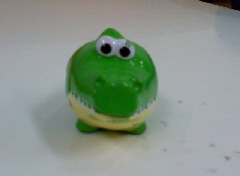
![]()
Caveat: My Life as Colonel Sanders
I was going to write about this yesterday, while on the topic of my new haraboji look, but I didn't finish.
My feelings were hurt, recently, by a colleague. Indirectly… her comment was actually reported to me by some students. And it doesn't really matter: the actual comment was quite some time ago, I imagine, and the teacher making the comments has now completed her contract at LBridge and departed.
The background: KFC is a popular fast food chain in South Korea, and, just as in the States, the Colonel is the ubiquitous advertising mascot. But because of the fact of his being elderly and iconically European-American, he ends up being a kind of caricature stand-in for all older Westerners. Just as it seems vaguely racist and definitely culturally narrow to say of Asians "they all look the same," it's not unheard of in Korean society to just say that all older Western males are "that KFC guy." And that, apparently, is what this other teacher said of me, to her students. Repeatedly.
I didn't have much interaction with the colleague in question. She didn't seem exceptionally interested in interacting with any of her coworkers, as a matter of fact. But I will note that I always noticed she had a great rapport with her students, and they really seemed to like her, so I felt a strong level of respect for her, from a distance.
One thing I've learned, over these last few years teaching, is that you have to be very careful about the sorts of things you say about fellow teachers and other adults to the children – they will tend to magnify what they have heard, and most certainly they will internalize it if they find it entertaining or interesting or funny. Having a colleague make that remark to her students about one of the token foreigners at LBridge is kind of a case study into how these unpleasant cultural stereotypes are perpetuated and reinforced.
Anyway… my personal observation is, I don't really like being called "that KFC guy" to my students behind my back, and it hurt my feelings. But there's not a lot I can do about it, except try to prove by example that such cultural stereotypes are inappropriate and inaccurate. So… 아자아자화이팅!
Caveat: More haraboji than before
I got my hair cut over the weekend. And my students were quick to notice. One student, Zina (she of the musical performance) said, "but teacher… you are more haraboji than before!" Haraboji (할아버지) means grandfather, so her meaning was rather obvious: she meant it made me look older. Oh well. You win some, you lose some.
Having gray hair in this youth-obsessed culture is a double-sided thing. On the one hand, I probably get treated more respectfully than many foreigners do, given the xenophobic edges of Korean society, because of the traditional "respect" due to elders. But on the other hand, people find it incomprehensible, for example, that I don't make an effort to dye my hair. No self-respecting forty-something Korean would allow gray hair to show. It's not just strange, to Koreans — it's impossible. I must be older than I say I am.
I we were talking about appearances and self-image in one of my classes the other day, and I said something along the lines of "so, how can we improve our self-confidence about our appearance?" It was a slightly rhetorical question, to which I didn't expect a response (nor did I have one, myself, really). But Sydney raised her hand immediately and blurted out, "Plastic surgery?" In all seriousness, even. Although Sydney does have an odd sense of humor, the fact that such an answer was on the tip of her tongue must indicate something about this culture.
In the news, today, Kim Jong-il was reelected, just north of here. Really? How shocking is that!
No Title
this blog post is directly from my cellphone. note ad£¬below. aint technology wonderful?
 |
||||||||||
|
||||||||||
 |
||||||||||
[below, added Monday night 2009-03-09]
I posted this as a test of the possibilities. I like that it’s possible. I’m disappointed that, since the Korean character-encoding is non-Unicode, it shows up as gobbledygook – but that’s my Korean cell-carrier’s fault, not my bloghost’s.
I wonder if posting html would work? I might experiment with that…
Other features that my bloghost could provide, in the “nice-to-have” category:
* turn the first line of the email into the title
* some indication that it was posted using SMS/email rather than from the website (e.g., that could show up instead of the uninformative “no title”)
* alternately, the ability to configure the above sorts of functionalities on the preferences page
x
Caveat: 그렇지?
I’ve been pondering the issue of whether or not I’m a Koreophile: I actually don’t think I am. When it comes to matters cultural, I think I may be more of a Japanophile (not to mention Hispanophile) than a Koreophile. Not that there aren’t a great number of similarities between Japanese and Korean cultures, as much as both sides would love to convince themselves and the world that there are none – as much as they despise each other, they’re linked by common history and proximity, rather like two annoying neighbors in a sitcom (but with more genocide). And I should perhaps consider the possibility that I would feel less fondness for Japanese culture (and more corresponding fondness for Korean culture) if I actually spent some time immersed in Japan, to provide a more authentic basis for comparison. It’s always easier to like something from a distance, from the outside.
Still, as a trained and passionate linguist, separately I keep my interest in and passion for languages in general. Also, I reserve a special passion for specific languages that seem exceptionally beautiful, elegant, interesting or unique to me in some way. Thus, although I may think I actually have a greater interest in Japanese culture than Korean culture, I find the Korean language much more interesting than Japanese. It would be difficult to explain why. Perhaps as a matter of comparison, I could reflect that although, because of my time in Latin America and my graduate work, I have a special fondness for and interest in Hispanic culture, I actually consider both French and Portuguese to be more interesting and beautiful languages than Spanish, as languages in themselves. In summary, I like languages for different reasons than I like cultures. Possibly, my feelings for specific languages are stronger than my feelings for specific cultures, too. Regrettably, it doesn’t make it any easier to get good at them.
Notes for Korean
그렇지 = indeed
그렇지? = is that so?
약속=appointment, date, promise
d받다=receive… a helping verb, seems to make a kind of passive
AV+[ㄴ/는]다고 is for indirect reported declarative speech with a descriptive verb (non-terminative)
V+고 있다 is continuous (progressive)
Caveat: Thank You, Flashing Neon Octopus
It was a rather disappointing day, I'm afraid. I was supposed to go to a 돌잔치 (which is a baby's first birthday, a very big deal in Korean culture) of a coworker's baby. I was planning to go with another coworker, Jenica, but at the last minute, she bailed. But she was the one who knew how to get there. I tried calling another coworker, Christine, who also knew where it was, but couldn't reach her. I suppose, if I'd been a bit more persistent about it, I could have gotten Jenica to give me directions that I could have used, to go on my own, but I was also not sure about the managing the cultural intricacies in solo mode. So I wimped out, and then felt bad about that.
I went downtown, and spent a very long time book browsing, in Youngpoong and Bandi&Luni's bookstores. I bought a few magazines, but the Economist, my main weekly staple, was still stuck on last week's edition, which I bought last week. I got an overpriced New Yorker magazine, instead, and yet another Korean vocab book to add to my collection of Korean textbooks that see too little use.
I was feeling depressed. I wandered around aimlessly for a while, and then I saw a flashing neon octopus. And I thought to myself: I still like Korea, despite everything. So I smiled.
I went into a Starbucks and ordered a 까페라떼하고 양파배글 (kkaperattehago yangpabaegeul = caffe latte and onion bagel), and studied Korean for a few hours.
Then I came home to Ilsan, and went into a hole-in-the-wall spot in the first floor of my building, that I've never visited before, and ordered some take-out bibimbap for a late dinner. It was a linguistic triumph! And then I came upstairs to my little home. I listened to Abba and Depeche Mode and cleaned my floor.
Thank you, flashing neon octopus, for restoring my sense of perspective. How did you do it?
Caveat: Think stupid. Get it stuck!
Today is blazingly bright, clear, sunny, windy, cold. It is just above freezing, probably, and the air is unusually damp, not like the normal cold, dry wind that comes with such clear days. It was raining yesterday, and today, puddles sparkle and you hear birds singing, and you can smell the pines.
For some reason the smell of the pines brings back strong, vivid memories of December, 1990.
I had completed MOS (occupational, or “advanced”) training to be an Army mechanic, at Fort Jackson, South Carolina. But the top 15 graduates of the MOS class were retained for an additional month of “recovery specialist” field training, and I was one of them. As the first gulf war was winding up with terrifying speed in Kuwait, our little platoon lived in two tents in the South Carolina woods for that month of December.
 It was cold and damp but often sunny in the afternoons, and we alternated between simulated infantry/combat type situations and vehicle recovery operations (basically, “how to drive and operate a giant green tow truck”). I was really bad at the infantry work… whenever I was in charge of my squad, I tended to make grave tactical errors and/or proved too cautious. But I was very good at vehicle recovery.
It was cold and damp but often sunny in the afternoons, and we alternated between simulated infantry/combat type situations and vehicle recovery operations (basically, “how to drive and operate a giant green tow truck”). I was really bad at the infantry work… whenever I was in charge of my squad, I tended to make grave tactical errors and/or proved too cautious. But I was very good at vehicle recovery.
One day, our training sergeant had us lined up one bright morning, when the weather was exactly like it was this morning walking to work. As a reward for something I’d accomplished, he said, “Way [remember, in the Army, you have no first name], I want you to take that vehicle out into the swamp and get it stuck.” He gestured at one of the two HEMTT’s our training unit had. This was a rare privilege.
I climbed into the cab, the sergeant got in as shotgun. I fired it up, and we drove it out into the swamp. These are not easy vehicles to “get stuck.” They are 8-wheel-drive, with the first two pairs of wheels linked to the hydraulic steering system. The tires are at least 4 feet in diameter. We scooted it back and forth in the muck, and the sergeant yelled at me if I got too timid. “Don’t be too smart, Way. Think stupid. Get it stuck!”
Finally, the front end resting in the water to a depth that covered the top of the front tires and was seeping into the cab, we had it completely immobilized, all eight wheels spinning and throwing up massive quantities of mud. “Damn good,” muttered the sergeant.
And we spent the rest of the day with winches and two tow trucks, getting the thing out. Those were my best days in the Army.
![]()
Caveat: The Line 3 Show
seoul subway. the old lady got on at apgujeong. she had two enormous duffel bags strapped onto a dilapidated two-wheel baggage cart, with some plastic bags on top. it was almost as tall as she was. it fell down on the floor of the subway car. one of the metal pieces of the baggage cart's frame had broken, and she was struggling to improvise a way to connect the two ends, separated by 10 cm of bulging black duffel. she had a jar of something… and was pounding on one end, while trying to hold down the bulge. a tiny, well-dressed woman began to help… then a kind-looking man in a brown suit jacket got involved… then a tall man in a nylon pale green ski jacket started helping too, and he was talking in soft, gentle tones to the frustrated old woman. here in the vast city, these people were showing a unwonted kindness to the old woman, and to each other. others looked on: in bemusement, amusement, or sheer pleasure at seeing such an odd drama unfolding. various solutions to the problem of the separated metal parts were tried, one after the other. people were offering advice or suggestions… it was so interesting. there was a point when the problem seemed solved. i exchanged grins with the kind-looking man in the brown suit jacket. but it was a false finish. the woman began tugging her cart, and the pieces separated again. second round… the man in the ski jacket used a key from the key-ring attached to his cellphone to widen the aperture of one of the rusted metal ends of the cart, and successfully forced the metal part in, again. the small well-dressed woman sat forcefully on the bulging pile, to get the two ends closer together. the old woman pounded on the bottom end with her jar, while the kind-looking man held things in place. at last, the cart seemed well-fixed, again. they stood it upright, while the entire subway car barely refrained from breaking out in applause.
Caveat: Silent Regrets
No, it’s not what it looks like – it’s not another melancholy post.
Rather, “Silent Regrets” is the name of a website I go to to find downloads of Korean TV shows and movies that have been subtitled in English. It’s the best place I’ve found for that sort of thing. Recently, I finally got around to finishing 옥탑방 고양이 (“Rooftop Cat”) and started something new called 밤이면 밤마다 (“When It’s at Night”). Not sure how I like this new one.
I’ve also downloaded and watched a few episodes of a Taiwanese TV show called “Silence.” Not sure if I like it or not… and it’s harder to justify sticking with it, since I don’t feel the same pressing need to use something like a TV show to improve my nonexistent Chinese, as opposed to my glacially improving Korean. But anyway. I thought I’d put a little plug for the website… it’s nice that someone provides the aggregating service for the fansubbed Asian movies and TV shows.
Caveat: some reason
As I noted here, before, I had a very bad day last Friday. I had a bad day for two main reasons.
The first reason was more typical emptyheadedness from the management here. But that sort of unpleasantness is a) par for the course, and b) easily forgotten — it's not hard to move on from that, whether because of habit or because it just isn't that big a deal.
The second reason had more sticking power, because it came from a student. Mostly, I think I have a pretty good rapport with my students, but sometimes I make mistakes, either in how I interact with them (too lenient, too firm), or in how I attempt to engage their attention. The problem last Friday falls under the former. I was obviously too hard on a student, and it had an impact on her. Unlike most students, though, E__ is good about expressing her feelings. She gave me the following note, which I transcribe verbatim, errors and all. I feel really badly about it all. She was (is) one of my favorite students, but now she's dropped out of L-Bridge. Was it because me? At least partly… here's the note.
To Jared
Hello? I'm E___. I wrote this letter because of some reason.
First, I can't see you on next semester. Then, you will not have like me, the rude student. I like this L-Bridge, but I've been in this for 3 years. So, I think I'll come in any, but next semester, I'll not come. Second, I've many mistake then every teacher said it is ok. But, in last last debate, I got mistake but you didn't say anything except you did a bad job. I suggest, I don't want that and every students will have stress, like me. So, please do not do that! It hurts me. Don't show this letter to other teacher. Thanks alot in this semester. Bye! – From E___.
Caveat: 지구를 지켜라 : 100살 모기 소송사건
On Saturday afternoon, I went to see a musical. More accurately, it was a children’s rock musical about global warming. The title was “지구를 지켜라 : 100살 모기 소송사건” (roughly: “Care for the Earth: The 100 year-old mosquito lawsuit”). I’m not sure if it’s the mosquito that’s 100 years old, or the lawsuit. Or both?
I went because one of my students, Zina, was in it. I understood only bits and pieces, of course. But basically, a bunch of children dressed as humans and various sorts of animals appeared to be debating the global warming situation on stage, and would occasionally burst into song and dance. It was awesome. It combined my love of watching things I don’t understand, with my interest in seeing my students perform and my interest in stage performances of all kinds. Not to mention the eco-angle.
I tried to take some pictures, but most of them didn’t come out so well. Here’s one with Zina on the far right, gesturing skyward.
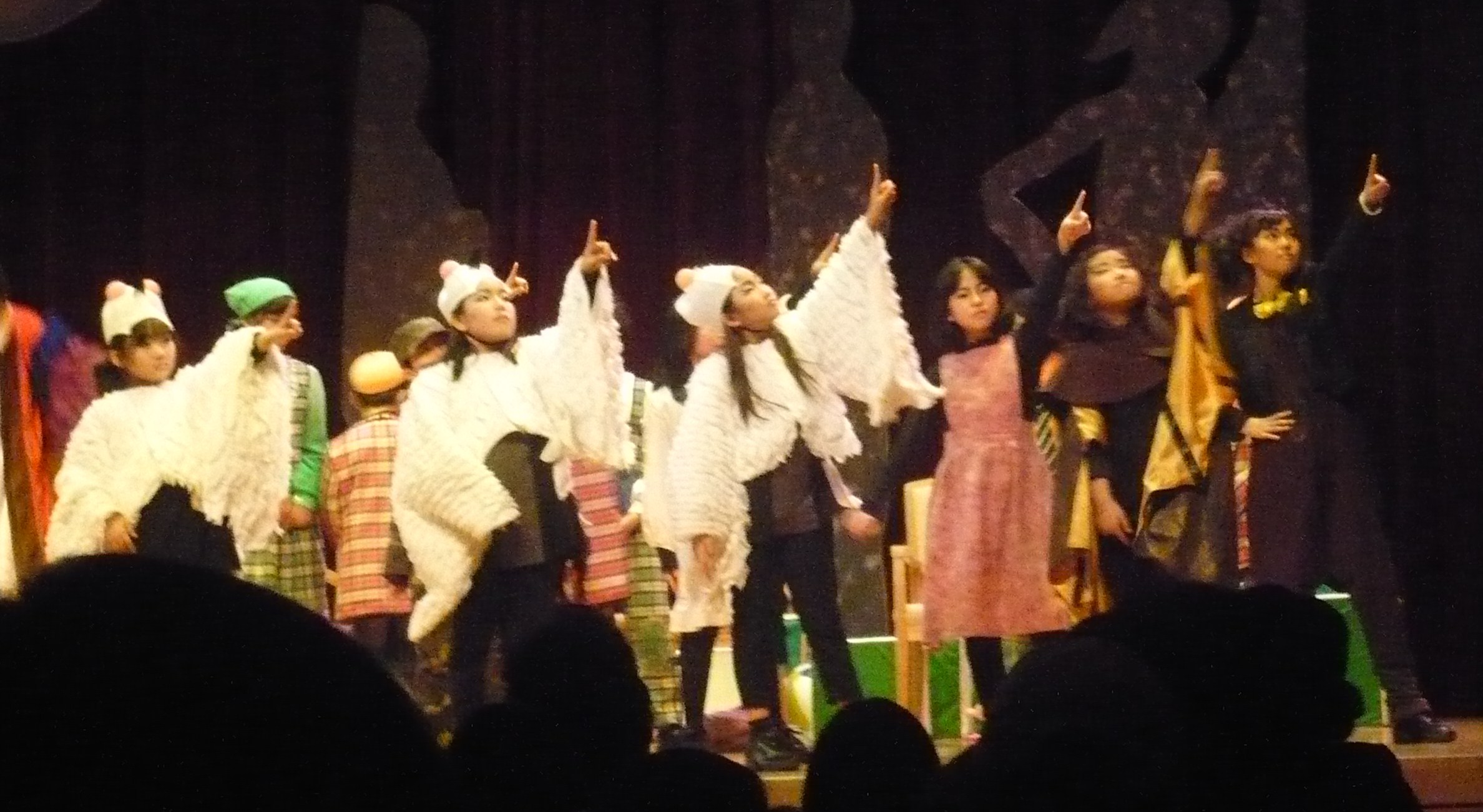
I don’t think of her as particularly tall, but she was the tallest-but-one in the cast. Everything being relative, when you’re a fifth-grader, I suppose.
I bought the CD, after the show. Some of the tunes were pretty catchy. I wish I could figure out how to post a music track here. Maybe I’ll work on that.
![]()
Caveat: The Police State
I went into downtown Seoul yesterday evening. Sometimes it seems that Seoul is occupied buy roving tribes of riot police with nothing to do.

You ask yourself: so… where’s the riot? Of course, political riots are to South Korea what Apple Pie is to America. That means, lots of times, the riot police are bound to find something to do. Messy democracy, and all that.
Mostly, I try to avoid the riots. Seems like the prudent thing to do. All I saw yesterday, though, were random platoons of riot police marching to and fro.
The attitude barometer, special end-of-term edition:
* Number of students who have quit L-Bridge where I suspect I’m part of the reason: 1
* Number of times I’ve opened my resignation letter and edited it: 1
* Barrier-surpassing moments of Korean-language usage (outside of work only): 2
* Spirit-destroying moments of Korean-language communication breakdown (outside of work only): 1
* Number of students that have said something to the effect of “teacher, you’re so funny” while fighting off an apoplectic fit of giggles: 2
* Number of times I’ve told someone that I am “much happier than when I was in L.A.”: 3
* Number of times I really meant it (as opposed to the “fake it till I make it” approach I’m fond of): 0
* Days I was late to work this week: 2
* Total number of minutes I was late, minus total number of minutes I showed up early: -10
soundtrack:
Maná
Dead Kennedys
Velvet Acid Christ
Albinoni
Ruby Zoom
Carl Orff
Nitty Gritty Dirt Band
Cold War Kids
Paul Oakenfold
![]()
Caveat: En la verde orilla
Los rayos le cuenta al Sol
Con un peine de marfil
La bella Jacinta un día
Que por mi dicha la vi
En la verde orilla
De Guadalquivir.
La mano oscurece al peine;
Mas qué mucho, si el abril
La vio oscurecer los lilios
Que blancos suelen salir
En la verde orilla
De Guadalquivir.
Los pájaros la saludan,
Porque piensa (y es así)
Que el Sol que sale en oriente
Vuelve otra vez a salir
En la verde orilla
De Guadalquivir.
Por sólo un cabello el Sol
De sus rayos diera mil,
Solicitando invidioso
El que se quedaba allí
En la verde orilla
De Guadalquivir.
— Luis de Góngora, 1580
Caveat: The Good. The Bad.
I had a really bad day. A really, really bad day. But it had some good moments. Here are some pictures. Highlights.
Below, little Dahye, and half of Paul.
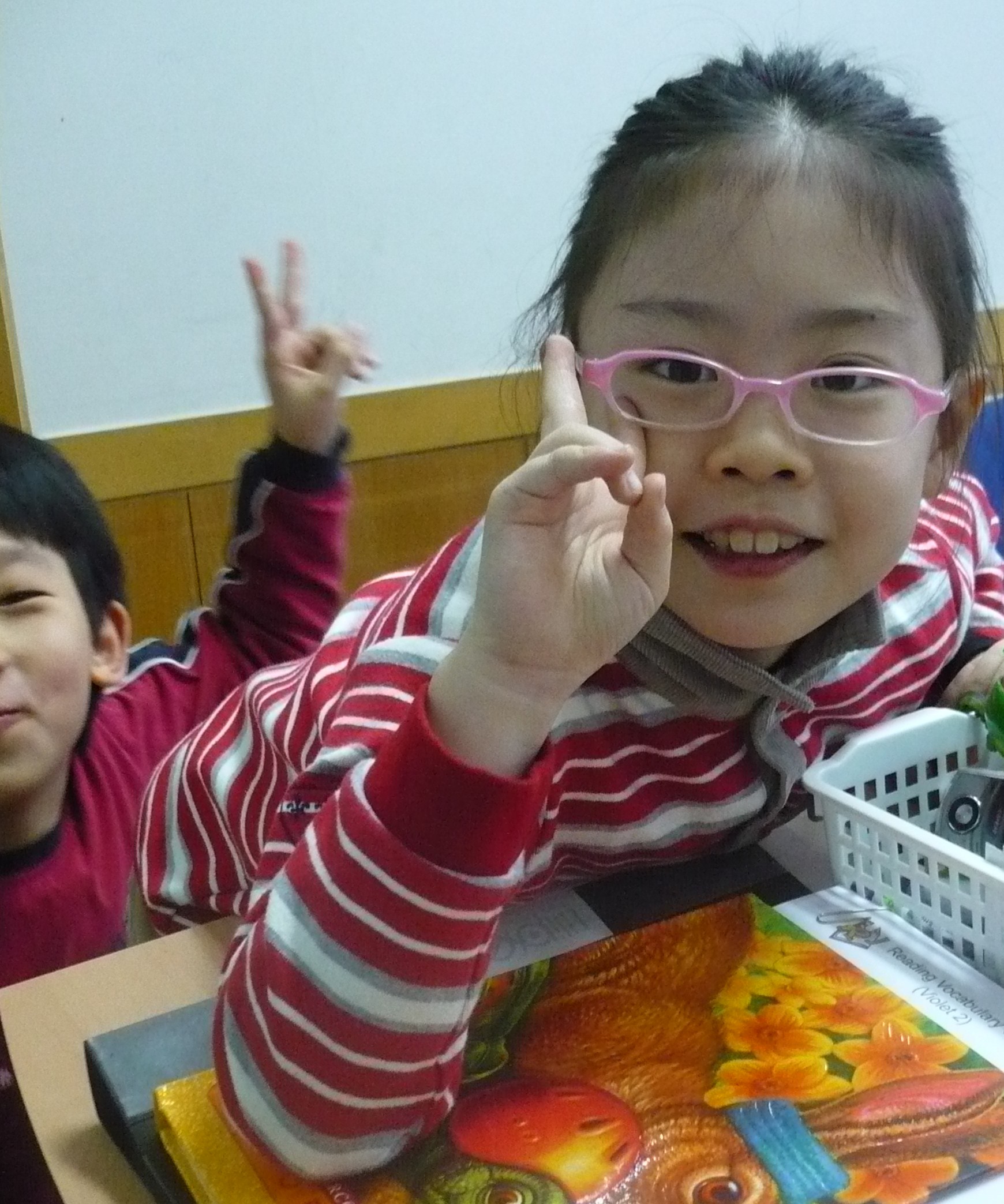
Below, some of my Goldrush kids: Stephanie, Jamie, Christine, Daisy, Sarah, Gina (in front of me), Nick (the poor lone boy in a class full of girls).
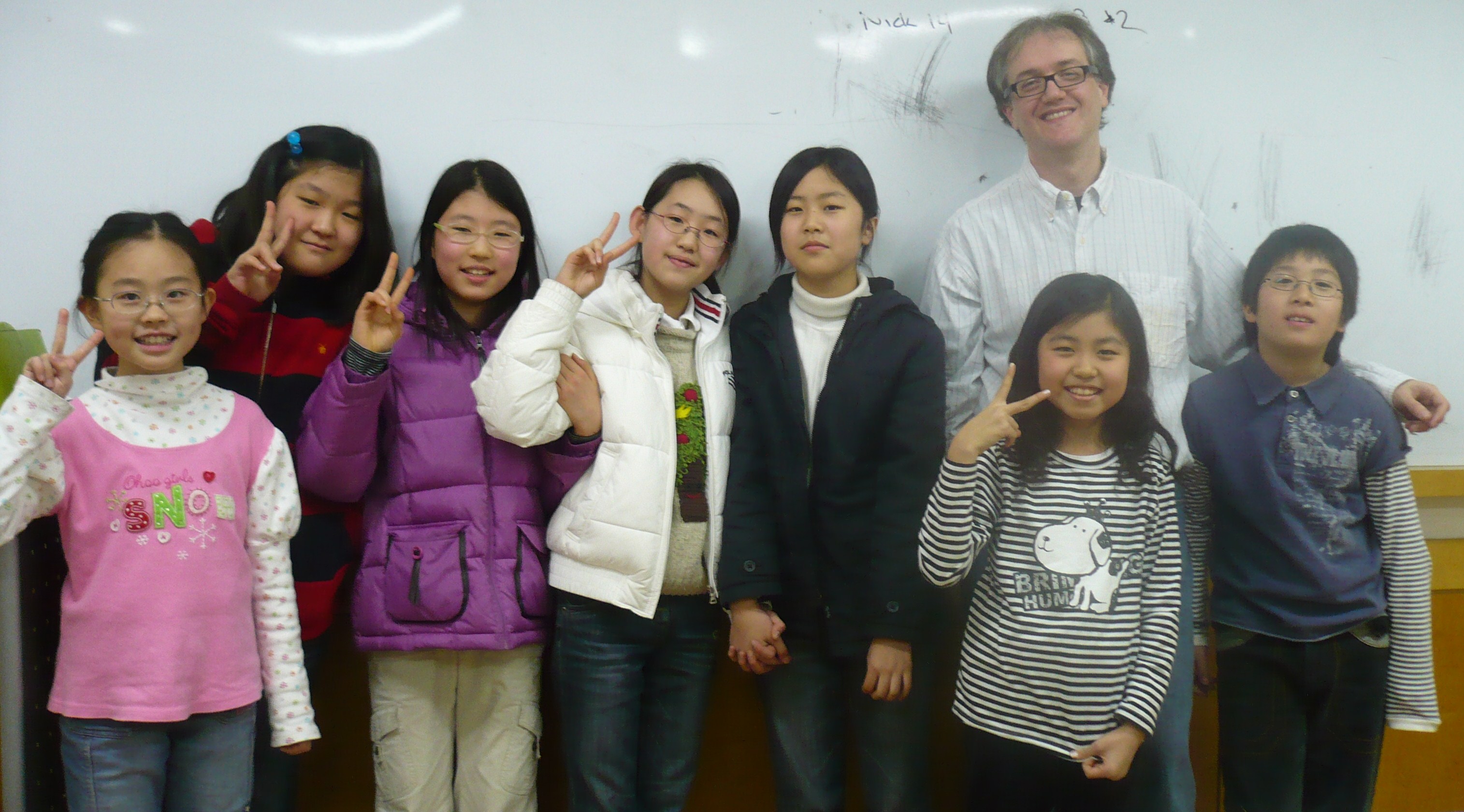
![]()
Caveat: Jin’s Dragon
Last day of the Winter term, today. That means… break? Oh, no such thing. Monday, it all starts over. More crazinesses.
This is Jin’s Dragon.
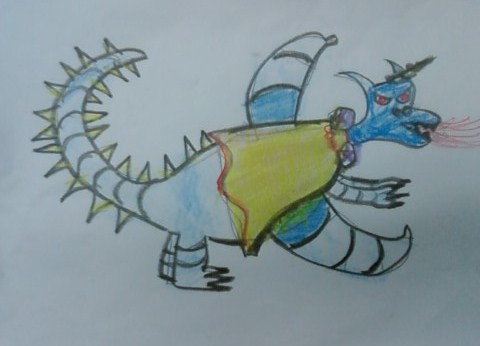
![]()
Caveat: Thank you, I don’t want to do that
I told my student David today that he explained some vocabulary words so well, in English, today, that he should be an English teacher. He smiled politely, and said, in almost perfect pronunciation and intonation: “Thank you, I don’t want to do that.” I was pleased.
It’s the last week of the Winter term. As has become my habit, I tried to take pictures of my some of my classes, to remember my students by. I don’t try to force them… some classes are more enthusiastic than others, and I feel uncomfortable insisting. But here’s a few who cooperated, to one degree or another.
The Goldrush2b kids: Thomas, Dexter, Kevin, Alex L, Peter P, Peter H (in front), Tommy (way in back), Silver, Jenny, Stephany, Lisa, Sophia.
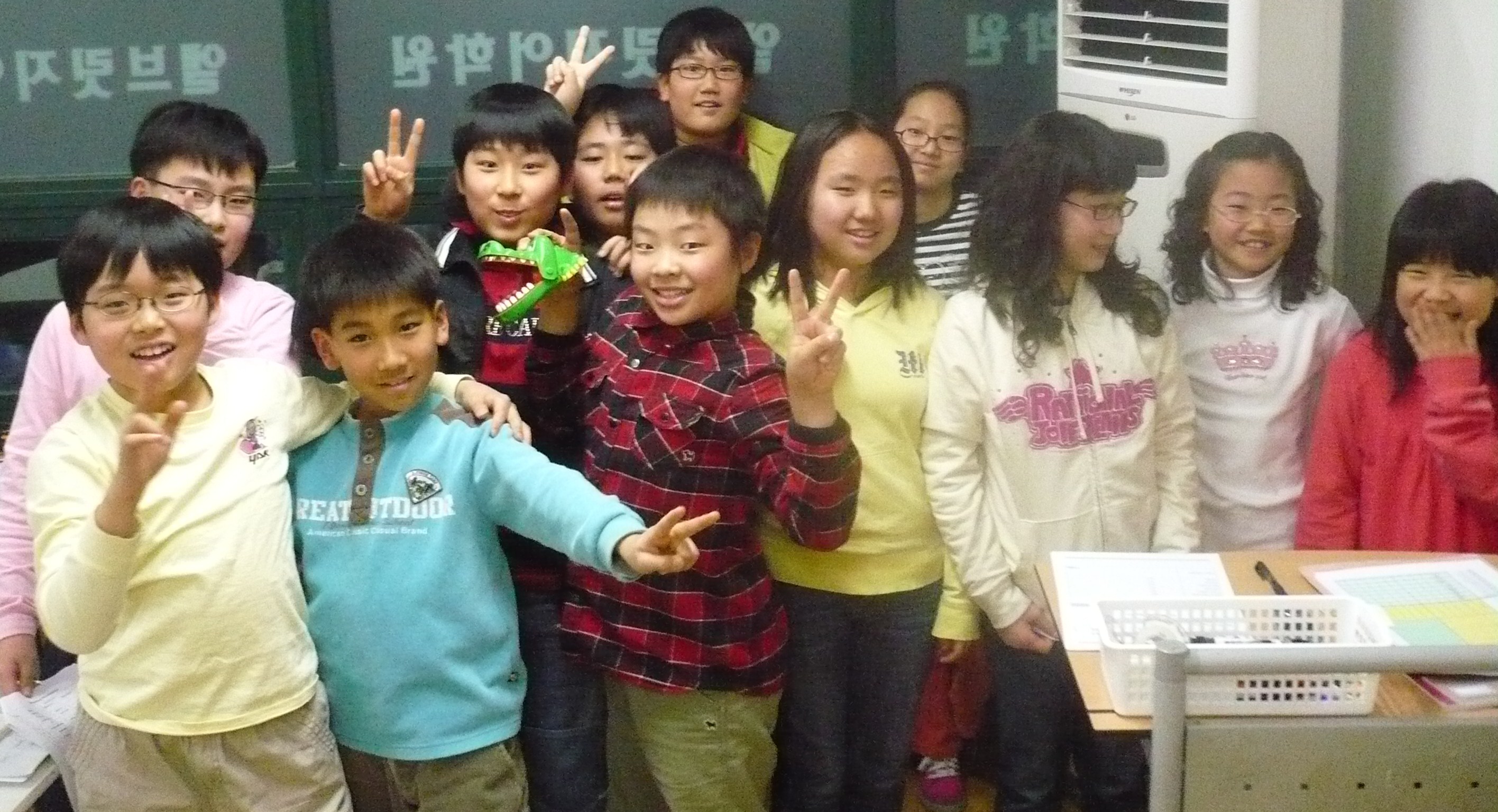
Sydney, waxing eloquent, and Eunice, saying something funny (undoubtedly).
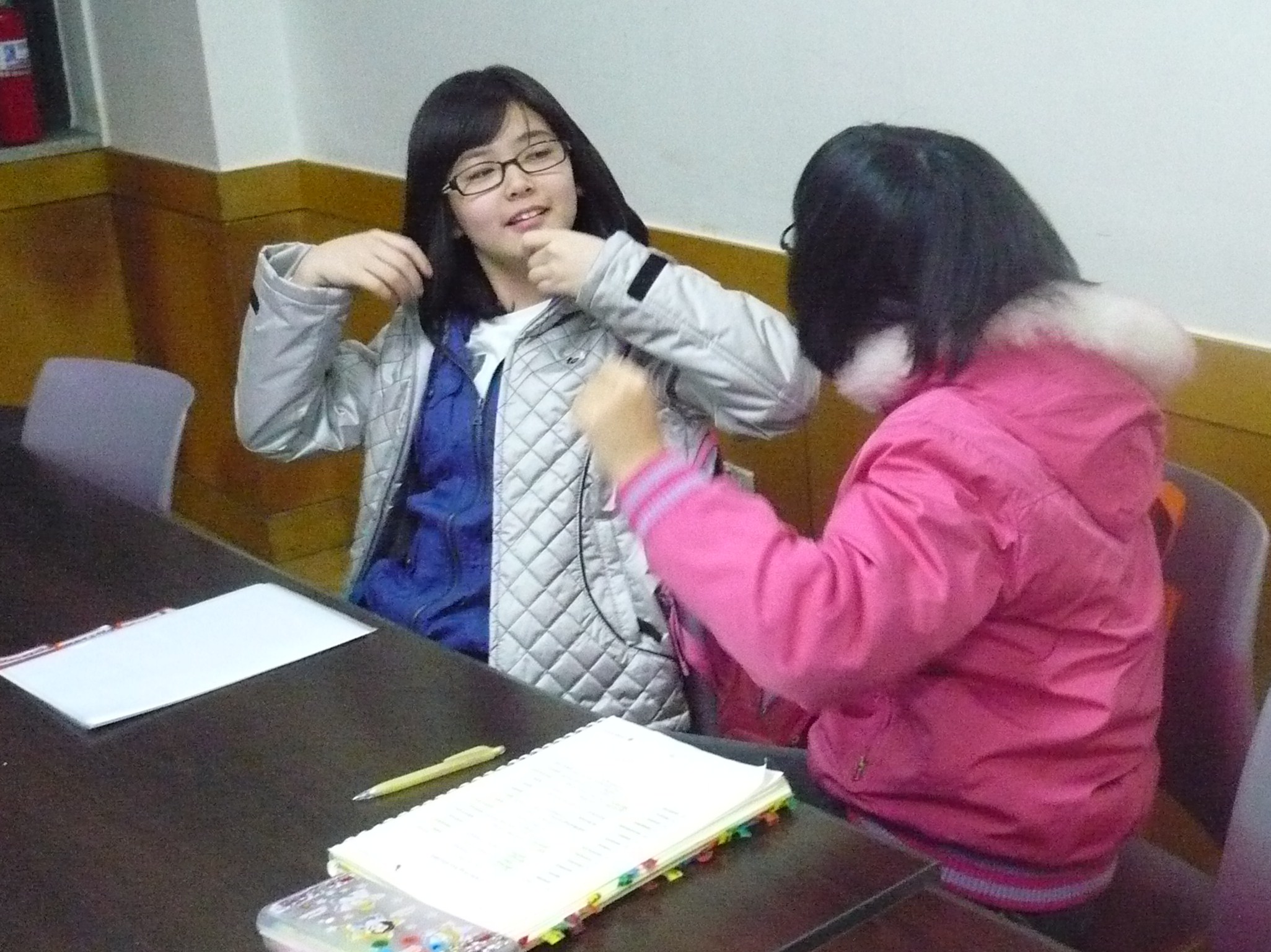
Eldorado1a kids: Sincere, Ellen, Julia (in back), Joseph, Mad Steven, Small Steve (NBA Steve).
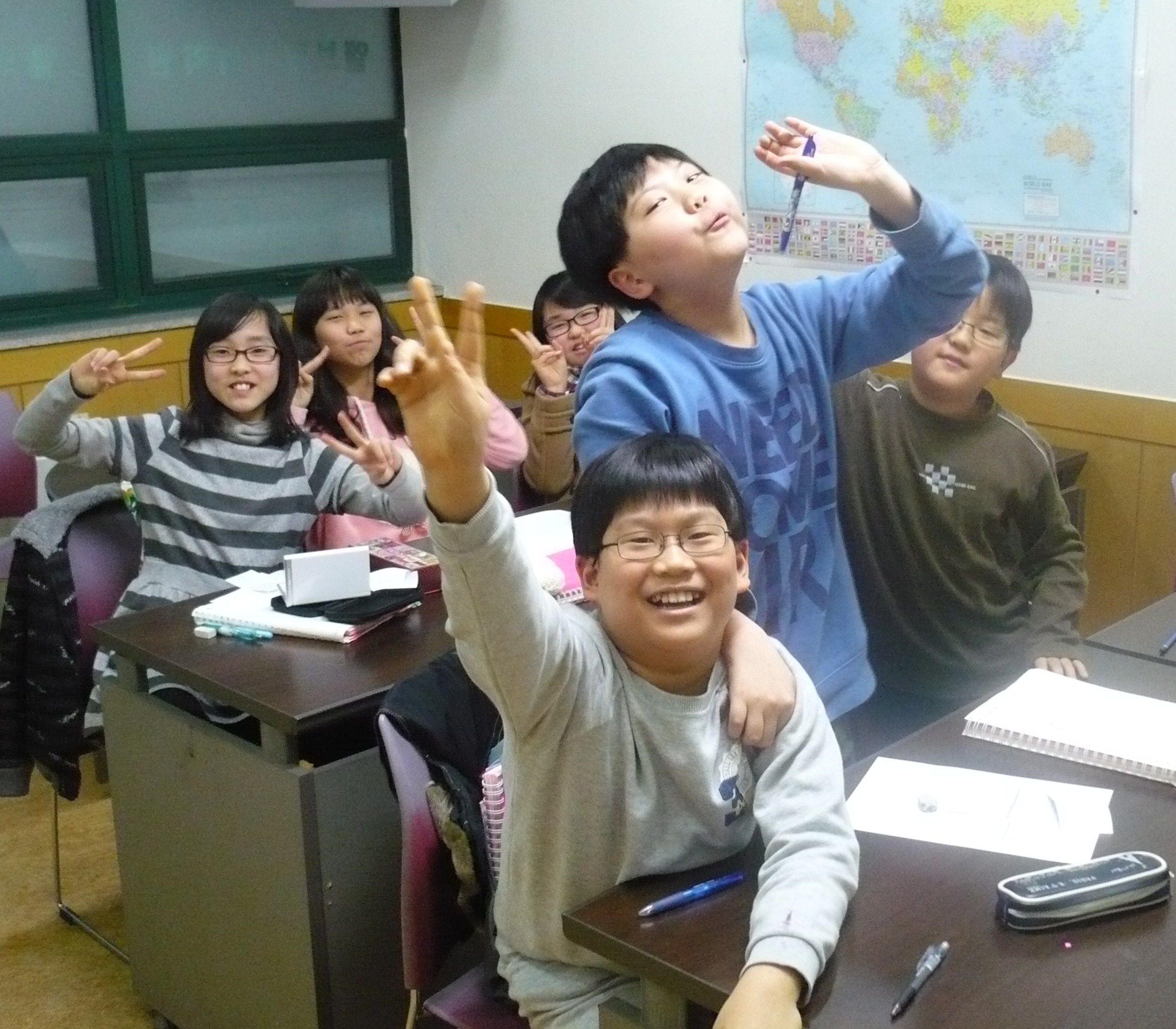
![]()
Caveat: HELLO!!MOUSE (Or, Why Koreans Must Study More English)
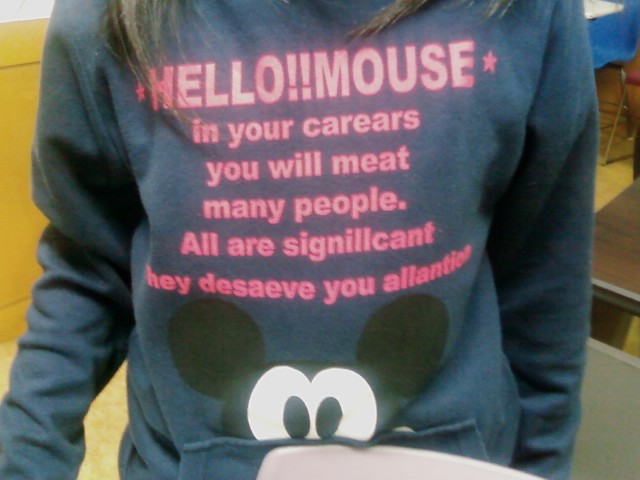
HELLO!!MOUSE in your carears you will meat many people. All are signillcant they desaeve you allantion.
![]()
Caveat: 악플 isn’t in the dictionary
What does 악플 mean? “악플” (akpeul) is a slang term I learned today, that means, roughly, the negative comments or “flames” that people write on internet sites. I think it’s cool that Korean has a special slang word for this. Not sure it’s particularly useful knowledge. But I’m always especially happy to learn words that can’t be found in any dictionary.
Caveat: “Off topic you are!”
My student Eric was giving a speech. Harry, another student, leapt to his feet and, pounding his fist confidently on the table, proclaimed, "Off topic you are!" It was pure Yoda-speak. And I began laughing uncontrollably, which left Harry a bit uncomfortable. So I had to explain that Yoda, in the Star Wars movie, is a very funny-speaking character, but that, if you study his language carefully, you realize he's basically speaking English words with Korean grammar. Which means that Korean students can "do" Yoda, sometimes, without meaning to. I'm not sure my kids fully understood or accepted my explanation completely. But they realized they could make me laugh by ending sentences loudly and confidently with verbs.
"Homework what is?" they demanded, at the end. Good students. Funny students.
Caveat: apple-onion-bean-rice-curry-stuff (Uh oh, Jared’s in the kitchen again)
In the spirit of my thoughts about meat, yesterday, and inspired by my success with some leftovers last week, I decided to get creative in my kitchen area. In a couple tablespoons of olive oil, I fried a chopped-up small onion, a generous scoop of minced garlic (which you can buy in tubs from convenience stores in Korea), some sesame seeds, some roasted salted peanuts, and half of a an apple, finely chopped. I added a pinch of red pepper and a tablespoon of curry powder. When things were browned, I added the remains of my cooked red beans (about 2 cups, which had been cooked with red pepper, soy sauce, etc, a few weeks back). I added a cup of cooked rice, and voila, apple-onion-bean-rice-curry-stuff. Totally delicious. Very nutritious. And completely vegan.
The attitude barometer, episode 5:
* Number of times I've opened my resignation letter and edited it: 4
* Barrier-surpassing moments of Korean-language usage (outside of work only): 3
* Spirit-destroying moments of Korean-language communication breakdown (outside of work only): 1
* Number of students that have said something to the effect of "teacher, you're so funny" while fighting off an apoplectic fit of giggles: 1
* Number of times I've told someone that I am "much happier than when I was in L.A.": 1
* Number of times I really meant it (as opposed to the "fake it till I make it" approach I'm fond of): 0
* Days I was late to work this week: 0
* Total number of minutes I was late, minus total number of minutes I showed up early: 0 (plus, I worked Saturday, again, for a few hours)
soundtrack:
Minnesota Public Radio ("the current" streaming)
Silvio Rodriguez
The Go Team
Aly & AJ
Proyecto Uno (Nuyorican rap / hip hop)
Big Bang (k-pop)
The Cure
Kray Van Kirk (really!)
Gordon Lightfoot
Caveat: Incidental Meat
I've been thinking about meat. I read an article in Scientific American about the "carbon footprint" of eating beef, specifically. It's quite stunning, and it has got me to thinking, once again, about whether or not I would ever seriously become some kind of vegetarian (maybe a chicken-and-fish-only type, or a real vegetarian, or even a vegan). All those things have crossed my mind many times. But I lack the self-discipline to stick to any of them, it seems like.
Only hours after reading the Scientific American article, I was ordering and eating bibimbap from Gimgane. The amount of meat in it is negligible, I suppose – at most some flecks of meat that might equal something under a tablespoon. I'm not even sure what species of meat it is. But… I'm not the sort to be a hardcore "I don't eat such and such," it seems like.
Still, it seems the compelling reasons for avoiding various types of meat keep building. There's health impact (unless you're an Atkinsian). There's ethical impact (I have been reading a book by Douglas Hofstadter, I am a Strange Loop, wherein he offers in his first chapter a meditation on meat-eating vis-a-vis the question of the relative sizes of souls). And now, particularly for beef, there's global environmental impact, too. The basic point: if we ALL quit eating beef tomorrow, and let the beef industry die, we'd do more to prevent the continuing global warming trend than if we ALL stopped using cars tomorrow. That's very plausible, if you examine the facts.
So, I'm wondering how I feel about it. I've been developing a sort of approach that is kind of based on the distinction between "incidental meat" versus "intentional meat." Intentional meat is when I go out and seek it. When it's the "purpose" of a dining experience. Incidental meat is where I'm eating meat because someone else has ordered it. Or they're giving it to me. Or it got added, unexpectedly, to something I ordered (like the bibimbap the other day). Maybe something can be made of this distinction.
Caveat: Mr Rogers’ Neighborhood
Last night, it was snowing. Or sleeting. Or freezing raining. Something like that. A blustery, damp, wind-driven, granular sort of snow. And it didn't really stick.
Today, there are patches of white, but the sky is thickly hazy, yet it's quite windy. A western wind, it seems like. That's a spring pattern, here, a deviation from the north wind (bitterly cold) or south wind (warmer but wet) that normally seem to alternate in winter. And yet it's quite cold, which means that it doesn't FEEL springlike – it feels like Minneapolis, this time of year, with the winds having whipped up across the plains.
That haze is the famous Chinese pall, I'd be willing to bet. The Mongolian desert sands, from a 1000 km to the west, saturated with some juicy Chinese industrial wastes. A bit early in the year for that, but the direction of the winds, and the color of the sky, make me suspicious.
Walking to work, these days, it's almost inevitable that I run in to some students, former or current. I feel like a Mr Rogers, strolling like a conspicuous alien through his Ilsan neighborhood. Putting on my teacher "happy face" despite the occasional turmoil inside.
"Hi Kevin!" "Hi, Annie, how are you?" "Hello, Joseph. Don't forget you have a test tonight." And I get those weird, disorienting bows that kids give to adults in public places (but that are utterly absent from the inside-the-hagwon environment, which I suppose is a tribute to the hagwon's efforts to instill a more "Western" atmosphere).
Soundtrack:
Beastie Boys
임형주 (that 행복하길바래 song I like)
Radiohead
Madonna
Spagga y La Raza (Nueva York)
PM Dawn
Caveat: [응덥 없음]
The browser says: “응덥 없음” which means “no response.” You know, the standard computer crashing thing, right?
Argh.
Caveat: Time Flows
Dahye writes in her journal, and describes playing with her friend. Then she concludes, "It was so fun that I didn't know time was flowing!" I thought this was a good line.
Caveat: Collateralized
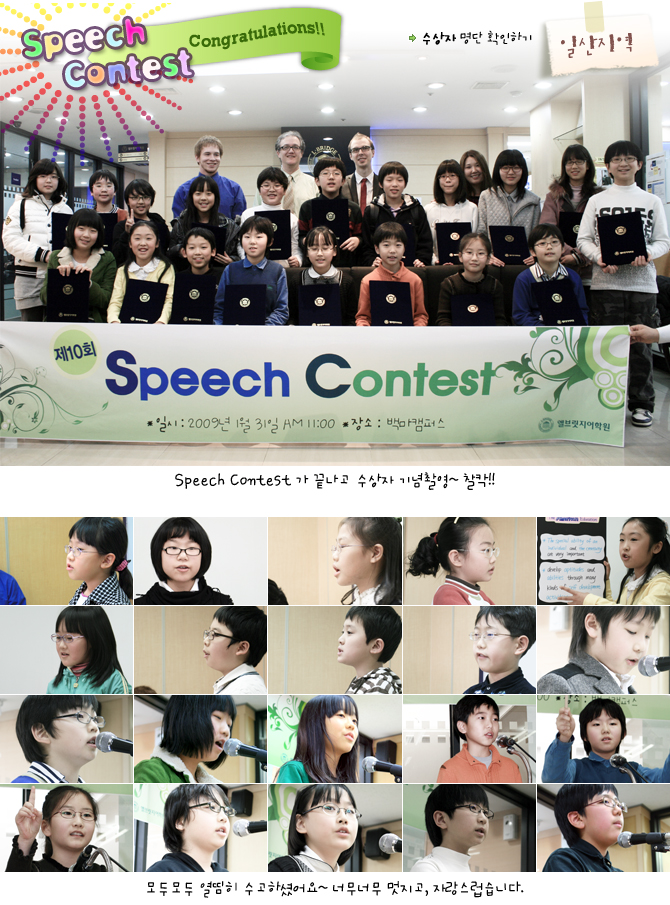 I have been collateralized – in the buzzword sense used in marketing departments these days: I’m being used to advertize a product.
I have been collateralized – in the buzzword sense used in marketing departments these days: I’m being used to advertize a product.
See the recent picture from the L-Bridge website at right, with the winners of the speech contest of a few weeks ago, with me and a few other spokesforeigners standing in the background, looking respectably foreign. [Clicking the photo will pop up a bigger version.]
Genius Willy is right in front of me, wearing a silly grin (I’m in the middle between Joe and Jeff, in the back). Other students I’m proud of: Sydney (far left of photo); Johnny (third from left, front row); Sarah and Rebecca (back row of students, 3rd and forth from right) – the face between Sarah and Rebecca is Sarah-teacher (the somewhat hard-to-get-along-with curriculum manager at L-Bridge. In the small square photos, top row, 2nd from left is Eunice (better known as CGHP! “crazy girl hot pink!” — don’t ask what it means, I don’t have a clue, myself) and top row, 4th from left is Lisa.
Actually, I’m most proud of Sydney, because she placed into the final 20 despite the fact that she pridefully rejected any kind of coaching of any kind from any of her teachers. All the other finalists received extensive coaching and help of various sorts (grammar, pronunciation, etc.) from their teachers.
![]()
Caveat: … restart your dog.
I dreamed an eerie, very coherent dream. Real plot. Real characterization. A story.
In the dream, I was driving in my pickup truck along an unpaved (or very poorly paved) stretch of highway. A very desolate place. There were two of me. Not like two sides of myself; not like a doppelganger or something; just two of me. Side by side, one driving, the other staring out the window. Traveling companions.
It was near sunset, and bitterly cold. The landscape was not mountainous, but not flat. The vegetation was Patagonian. Really, the stretch of road was like that long, mostly straight rise from Osorno to the Argentine border in Chilean Patagonia. Like… driving up to Bariloche, on the Argentine side, with the volcano Igi Llaima (err, I think it's Igi Llaima) hovering like some undiscovered, exotic Fuji above the distant lake, below and behind.
It was starting to snow. And although the landscape seemed like Chile, the roadsigns were in Korean. Of course.
It was getting dark, and I was worried about something. One of me was worried. The other just shrugged, and muttered, do what you want. So we stopped. We pulled up a steep stretch of side-road, up against a fence under some gnarled, twisty, Japanese-painting pine trees. Darkness fell. We climbed into the back of my pickup, to sleep.
We awoke to the sounds of traffic. I looked out and it was morning. There was at least a foot of freshly fallen snow, but it was heavy, wet snow, like heaven throwing snowballs at Earth. Still falling. On the road below, there was a traffic jam. All the cars had Korean plates, but I saw a group of Chilean carabineros monitoring the situation from the comfort of their idling car, a ways up the road.
Several vehicles had pulled off the highway behind us, up the steep drive to stop near us under the trees. One truck, driven by a smoking team of Korean blue-collar types, was trying to negotiate around a pile of snow that appeared to have a car buried inside it. And suddenly, the truck began to skid sideways down the steep drive. It plunged into the traffic below, with almost no sound — in the weird, puttering silence that comes in blizzards. Squoolurshshsh…
There was a weird yelping sound. I saw that a dog lay in the road near the bottom. Like a golden retriever puppy. I popped the back of my camper top on my pickup truck and ran down the slippery road to pick up the dog. It was dead — struck by the out of control truck.
The other me came down beside me, looking on impassive. I was horribly upset, but I didn't say anything.
And then I said (the other "I" said): "You'll need to get to level ground, if you want to restart your dog." Like… giving advice to someone who's trying push-start an old car. It made strange sense, but it was still utterly useless advice.
I woke up.
Caveat: Subversive Hilarity
As part of our curriculum, we have these newspapers (which are presumably level-appropriate current-events newspapers that the kids can read, and from which we get many of our debate topics). I actually rather like the newspapers, despite their many mistakes, as the kids seem to get into actually being able to talk about relevant current events in class. I had a funny experience, however, recently. And some of my students actually "got it" when I pointed it out to them.
You see, with the newspaper comes a workbook, which includes some pages of difficult vocabulary to review. At the top of the page, it says, "반복 학습을 통해 반드시 암기하고 Reading Comprehension과 Writing을 통해 그 쓰임새를 학인합시다." (rough translation: blah blah memorize these words blah blah")…. Then, farther down, in the list of vocabulary words to memorize, they give this word with its example sentence: "proficiency 숙달, 능숙 example: Pushing children to memorize vocabulary or grammar rules will not lead to a high level of language proficiency." This is subversively hilarious.
Caveat: The Richard Nixon of Operating Systems
Really? Check this out: “In many ways, Windows Vista has become the Richard Nixon of operating systems: controversial, scandalous, perhaps unfairly vilified at times, but ultimately reviled by many.” – at ChannelWeb.
Hahahaha. Cry. Cry. Etc. Truth is stranger than fiction. And true metaphors are stranger than fictional ones?
Alternately, in the spirit of the just-passed V-day, consider this: “Fantasy love is much better than reality love. Never doing it is very exciting. The most exciting attractions are between two opposites who never meet.” – Andy Warhol. Indeed, my life is profoundly, inexcusably exciting.
The attitude barometer, episode 4:
* Number of times I’ve opened my resignation letter and edited it: 1
* Barrier-surpassing moments of Korean-language usage (outside of work only): 1
* Spirit-destroying moments of Korean-language communication breakdown (outside of work only): 2
* Number of students that have said something to the effect of “teacher, you’re so funny” while fighting off an apoplectic fit of giggles: 2
* Number of times I’ve told someone that I am “much happier than when I was in L.A.”: 0
* Number of times I really meant it (as opposed to the “fake it till I make it” approach I’m fond of): 0
* Days I was late to work this week: 1
* Total number of minutes I was late, minus total number of minutes I showed up early: 15
recent soundtrack:
Last Alliance (JPop with a sanitized grunge flavor)
KoRn (pure anger from Bakersfield)
Bob Dylan
Elis Regina
Queens of the Stone Age
![]()
